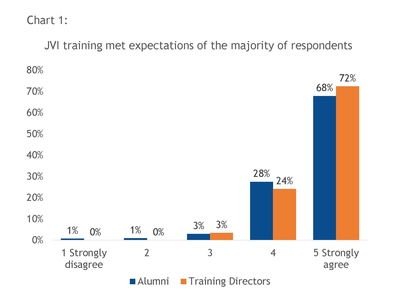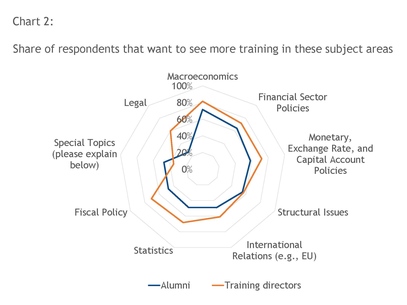2017 Alumni and Training Directors Survey: Stakeholders Happy with the JVI’s Work
April 20, 2017


To ensure that the JVI’s capacity development efforts are most effective, it is important to hear from the JVI’s partners in the region about what works and what could be improved. In preparation for the <link internal-link internal link in current>Second Meeting of JVI Training Directors, the JVI surveyed training directors and alumni, asking them to assess the training offered and to help identify areas where additional training and capacity development is needed. The feedback for the JVI’s current work was overwhelmingly positive, and also highlighted areas where authorities see additional needs. The input received from the survey will be important for shaping the JVI agenda in the years ahead.
About 95 percent of the survey respondents said that JVI training met their expectations and was helpful to participants in their current job and in their career development (see chart 1). The results are similar to those received in 2014, the first time such a survey was conducted, but were even more favorable this time. Below we summarize the main findings of the survey; more detailed results can be found <link file:2401 internal link in new>here.
Good response rate
Almost 1,100 responses were received from alumni who participated in at least one course at the JVI from 2014-16. About 30 training directors (JVI counterparts in central banks or ministries of finance in JVI target countries) also provided feedback. Of the respondents, the largest group were alumni from central banks (42%), followed by alumni from ministries of finance (18%). Staff from these two institutions also constituted the largest share of participants in JVI courses for the period covered, although ministries of finance were somewhat underrepresented among survey respondents. As some training directors commented during a discussion of the survey results, this may well have been driven by the high levels of personnel turnover in CESEE ministries of finance. Two-thirds of the alumni respondents were junior or mid-level officials and one-third was at supervisory or higher levels (e.g., division heads or deputies). Of the survey respondents, 40% had taken more than one course at the JVI over the past 5 years.
The JVI fares well compared to other training providers
Four-fifths of alumni respondents had also participated in economics-related training in other institutions, usually the training centers of international and regional organizations and foreign central banks. This allowed comparisons between training at the JVI and elsewhere. The overwhelming majority of respondents found the quality of the training at the JVI to be above, or far above, that provided by other institutions, in terms of both course content and administration. This finding refers specifically to the overall quality of training, the information available about the training, its usefulness for their jobs, and the competence of the instructors. However, alumni, and to a lesser extent training directors, report that acceptance to JVI training courses is somewhat more competitive than at other institutions.
Evolving training needs
In terms of the subject areas of most interest to alumni and training directors, courses in macroeconomics; financial sector policies; and monetary, exchange rate and capital account policies are the highest priorities (chart 2). Predictably, there was a divergence of interests between ministries of finance and central banks. For instance, respondents from the ministries of finance would like more courses on fiscal policy and macroeconomics than their central bank colleagues.
The respondents also provided a long list of JVI courses they would like to see in the future, some general and some quite specific and often innovative. Some of the topics suggested are already covered in JVI courses but could be expanded; others are yet to be incorporated; and some simply lie outside the JVI's core competences. Topics frequently mentioned include: financial stability, supervision, payment systems, IFRS standards, public finance management, gender budgeting, tax policy and administration, trade issues, and European Union coordination/accession.
Increasing demand for online learning
The survey results seem to confirm that JVI offerings are relevant for the target audience, meeting needs and expectations as they evolve. There is increasing interest in the IMF’s online learning modules, some of which are available in Russian. Training directors also emphasized the importance of online learning, completion of which in some institutions has already become a requirement for applying for JVI face-to-face training.
Some divergence in opinion
With a few exceptions, the institutional view provided by training directors largely coincided with that of alumni. Among the exceptions is the technical level of the courses the two groups are most interested in: alumni want more hands-on training; training directors see the need for more technical econometrics and modelling courses. Both agree, however, on the importance of practical hands-on workshops and having more lecturers with technical assistance experience.
Feedback on course administration
Overall the alumni and training directors appeared satisfied with the course administration procedures and information availability. The alumni expressed interest in receiving more information via social media and in having reading lists and course materials available to them ahead of the courses. All the suggestions emerging from the survey were discussed with the training directors and will be taken into account in future JVI planning.
Maria Arakelyan, Senior Research Officer, JVI











